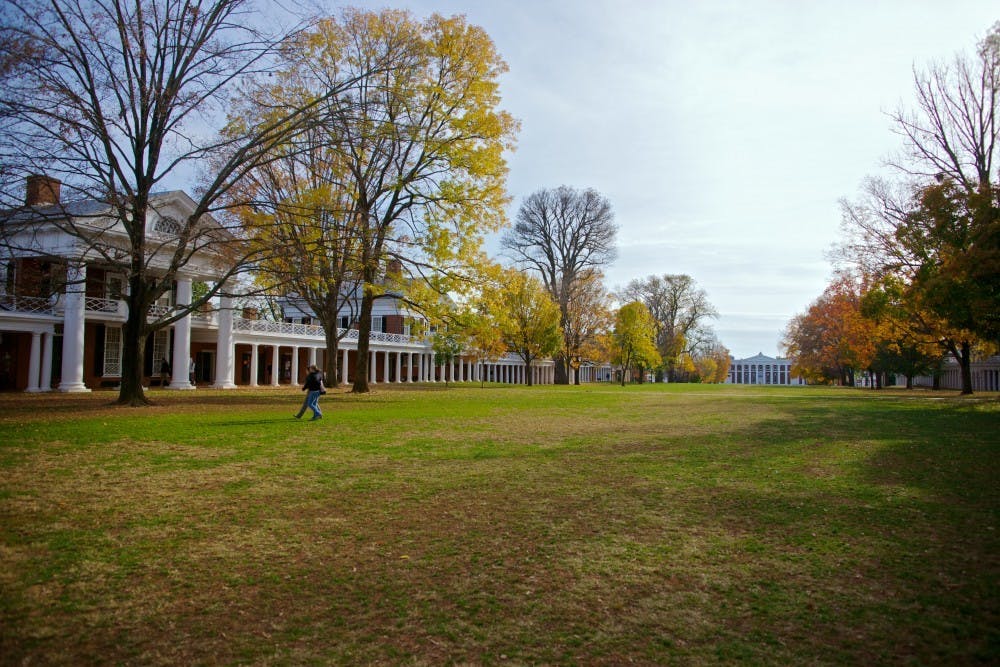Over 40 students attended a panelist discussion with Charlottesville activists Thursday, the last event of a three-day series for Know Your Rights Week, which is designed to inform students about how to use their rights to fight oppression. The panel — which was organized by the Black Student Alliance, Political Latinxs United for Movement and Action in Society and undocUVA — featured local activists.
Last year, Know Your Rights Week was condensed into a single day, but in a change to that formatting this year, groups spread out their events over the course of the week. Events included a “Policing and Protests 101” information session Oct. 26 and an undocUVA training Wednesday which discussed community issues of policing and the roles of the three organizations in their activist work.
“We got a large range of people that we probably wouldn’t have gotten if we’d just done [the events] at one time,” said third-year student Batten student Donavon Lea, who moderated the panel.
Issues of police misconduct and racism dominated Thursday’s discussion, including the mislabeling of incarcerated people, links between Immigrations and Customs Enforcement and local police and police abolition. Student participants posed questions about student engagement and hope amid the current political climate.
The speakers — all activists in the Charlottesville area — included former member of the Charlottesville Police Civilian Review Board Don Gathers, Donna Gasapo from ICE out of CVille, Luis Oyola from the Legal Aid Justice Center, Black Lives Matter community organizer Angeline Conn and Director of Lending Hands Cherry Henley.
The first question posed by Lea discussed the appropriate term for referring to “victims of the carceral state,” which includes people in prison or in ICE detention. Both Gathers and Oyola reiterated the importance of recognizing the impact of rhetoric such as “detainees,” which creates a false connection between the idea of a criminal and an undocumented immigrant.
“We’re always putting out the fact that these are human beings, not people who are defined by enforced incarceration,” Oyola said.
The dialogue also focused on issues surrounding police reform — not just because of racial profiling and police brutality but also because of section 287(g) of the Immigration and Nationality Act, which allows data sharing between ICE and police departments, blurring the line between what is considered civil and criminal law. Under 287(g), local law enforcement is able to arrest people they suspect are undocumented, notify ICE agents when an undocumented person is released form jail and hand over a detained person to ICE officials through a detainer request.
“A lot of people don’t know that these detainee requests happen under civil law, not criminal law,” Oyola said. “So, there’s no actual constitution basis to throw someone in jail or keep someone in jail just for that. But regardless of that there’s not an actual law that prohibits it.”
Both Gathers and Conn said that police reform is a lost cause. They explained that it is necessary to abolish policing and instead reinvest in community work — like education, mental health, housing and social initiatives.
“You just have to realize that some things just can’t be fixed,” Gathers said, in reference to police reform. “When you have someone and hatred towards Black and Brown people is embedded in their soul, I don’t care how much training you put in front of them. It’s not going to change who they are.”
The discussion then shifted to the University community, as Gasapo called out former University President Teresa Sullivan and University police for failing to protect students after white supremacists marched on Grounds during the “Unite the Right” rally in August 2017. At one point skirmishes broke out and some counter protesters, including students, were injured. The issue, Gasapo explained, was that the police stood by and “did nothing.”
Students attending the panel expressed interest in current activist campaigns, like defunding the police and helping with ongoing projects. Gathers proposed persuading the University to paint Black Lives Matter in Scott Stadium to show solidarity, adding that he sent an email about this to coaches and University President Jim Ryan but has received no response.
Gathers also reflected on the need to stay inspired, especially during times when it feels like no progress is being made. Henley added that perspective really makes a big difference.
“If somebody keeps telling me that I’m Black and I can’t make it, that’s going to be my attitude, and sooner or later I’m going to believe that I’m a victim,” Henley said. “But I don’t teach my people half-truths. I tell them that they are more than capable. I tell them that they can do it.”
BSA, PLUMAS and undocUVA have been working together with local organizations and activists, coming together to organize events like Know Your Rights Week.
“[The activists] are very much a part of our community,” said Frank Valdez, fourth-year College student and vice president of PLUMAS. “They are the inspiration for everything we do on Grounds.”
PLUMAS, BSA and undocUVA have also been working on mutual aid projects within the community, including defunding and divestment campaigns, and they hope to continue working together in the future.







